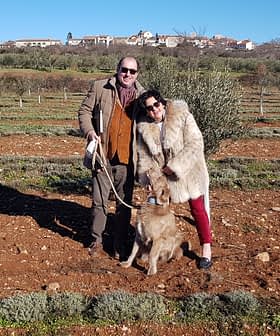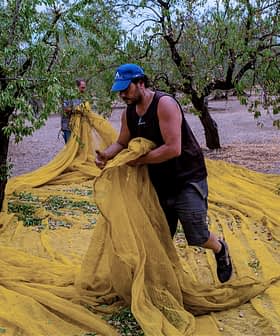Italian olive oil millers are the focus of a new set of recommended best practices aimed at enhancing milling operations and improving olive oil quality ahead of the upcoming harvest.
Unaprol, the Italian association of olive oil producers, and the dozens of members of the Olive Millers Associated (FOA) said the recommendations are part of a wider effort to broaden the knowledge of modern olive transformation technologies and promote a better olive milling culture.
Supporting the olive oil master professional figure would also mean supporting the overall competitiveness of Italian olive oil.
The recommendations come on the heels of an initiative from the Italian Olive Millers Association (AIFO) and the National Confederation of Small Enterprises (CNA), which asked the Italian government and parliament to recognize the professional status of the “olive oil master” (Maestro Oleario, in Italian).
Currently, the status is only recognized in Puglia, a southern Italian region and the largest olive oil-producing area in the country.
See Also:New Financial Aid for Apulian Millers Crippled by Xylella FastidiosaHowever, Maria Lisa Clodoveo, a food science and technology professor at the University of Bari in southern Puglia, recently told the Italian senate that olive millers are a crucial node in the production chain, and the status should be recognized nationally.
“It is crucial to acknowledge the know-how of the olive oil millers since a bottle of extra virgin olive oil is much more than just a liter of lipids,” she said. “It brings with it the organoleptic qualities of the product, which affect the hedonistic value of food and the health of the consumer.”
“It also brings a series of immaterial values such as the territory, the history, the landscape, the tradition and the culture,” Clodoveo added. “Supporting the olive oil master professional figure would also mean supporting the overall competitiveness of Italian olive oil.”
Meanwhile, the recommendations focus on limiting exhaust gases produced during the harvest and correctly using technical lubricants on the machinery. They also ask for proper maintenance of the harvesting equipment.
The recommendations also dissuade the use of traditional jute bags for the transport and storage of olives, with bins being preferred. They also advise millers to use electrical equipment in their facilities that are cleaned regularly.
All scheduled maintenance operations, machinery greasing and mill cleaning should be conducted before olive transformation begins.
“Cleanliness is basic for a high-quality olive mill,” said Michele Librandi, an agronomist, FOA member and co-owner of the Tenute Librandi olive oil mill in the southern Calabria region.
“It is also the expression of a culture we are insisting on,” he told Olive Oil Times. “This concept should never be underestimated, as it informs all operations.”
Librandi added that, historically, millers viewed olive oil as an easier product to handle than milk due to its lack of bacterial charge. As a result, he implied that less care had been taken in handling the olives and producing the oil.
“A tidy and clean operational space is the best business card for an olive oil miller,” he said.
Librandi emphasized how the technical courses aimed at olive oil millers are attracting many participants from the younger generations.
“We are seeing many companies sending the younger generations to learn how to make the best use of the most modern machinery,” Librandi said. “Even if many mills are still formally operated by older proprietors, it is often their children or younger employees investing time in learning the cutting-edge techniques and procedures.”
See Also:Adding Water During Olive Oil Production Lowers Quality, Researchers FindIn the last few years, transformation technologies have undergone significant changes and upgrades, mainly for the pressing and kneading processes, requiring a new approach to operations.
For example, Librandi cited the use of heat exchangers to maximize yields from olive paste, new ultrasound technologies and the light vacuums used for kneading.
“There are several technologies which are not part of the average mill yet, which are worth studying,” he said.
The National Recovery and Resilience Plan laid out by the Italian government is expected to support the upgrade of olive mills.
According to the most recent data published by the public agency Ismea, there were 4,470 millers active in the last four seasons in Italy, with significant differences in dimensions, treated volumes and technologies. Seventy-six percent of those companies transform less than 500 tons of olives.
“When we talk about sustainability and reuse, smaller olive millers could find it hard to improve their operations,” Librandi said. “We hope our initiative will make it popular for them to associate with other small companies to adopt the best standards in the industry more easily.”
Along with increasing efficiency, the recommendations also emphasizes the importance of sustainability.
“Sustainability for olive millers usually means circularity, as companies tend to use all the raw material,” Librandi said. “While production byproducts were treated as waste in the past, now operators realize that the byproducts can and must become a new resource.”
For much of the past decade, millers and researchers have found various uses for wastewater from the milling process, including electricity generation and irrigation. Similar work has been done with solid remains from the olive milling process, including asphalt manufacturing and biofuel production.
“Think of the olive pit as fuel to heat the olive miller operation areas or heat up water,” Librandi said. “Many olive millers sell this fuel to the consumers, who are often the olive growers.”
“The non-wooden portion of the drupe is increasingly used as an ingredient in animal food,” he added. “Phenols and antioxidants in the vegetation waters can also be used as additives for such food.”
Leaves and other organic material removed from the olives during the washing phase and before the start of the milling can also be used to produce compost and fertilizer. Other organic residue is sometimes used to produce biogas.
“Such a circular economy sees the olive mill at its core,” Librandi said. “Milling companies are adjusting and taking advantage of new opportunities. The millers should not be forced into one direction or the other. They should have choices to make and see which ones offer more opportunities to them.”









